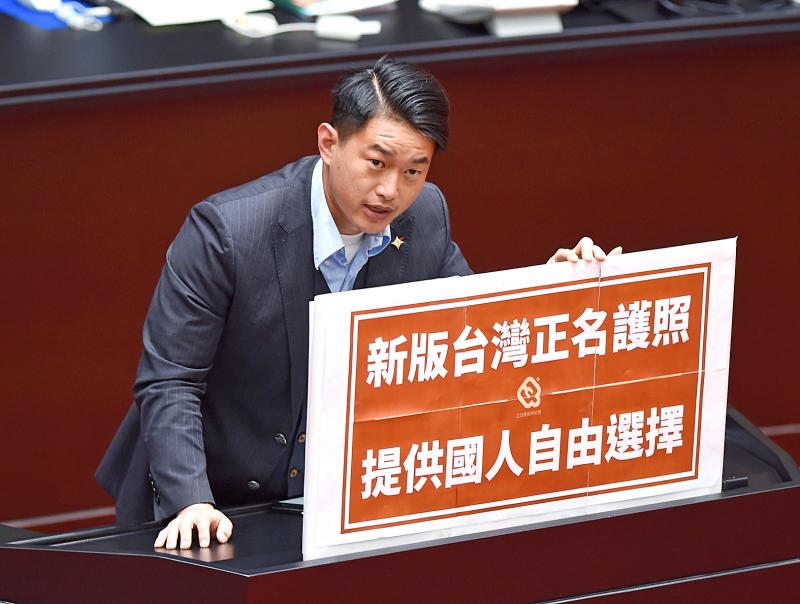The Taiwan Statebuilding Party is drafting a “China relations act” aimed at replacing the “outdated” Act Governing Relations Between the People of the Taiwan Area and the Mainland Area (台灣地區與大陸地區人民關係條例), Taiwan Statebuilding Party Legislator Chen Po-wei (陳柏惟) said yesterday.
The announcement came a day after Democratic Progressive Party (DPP) Legislator Tsai Yi-yu’s (蔡易餘) unannounced retraction of his proposal to remove the wording “unification of the nation” from the existing act from committee review.
Polls since last year have shown that more than 60 percent of the public identify as Taiwanese rather than Chinese or both, and that about 83 percent of respondents younger than 30 consider themselves Taiwanese, Chen wrote on Facebook.

Photo: Liu Hsin-de, Taipei Times
Given the clearly burgeoning Taiwanese identity, lawmakers should make a stand regarding the future they envision for the nation, he wrote.
A well-defined legal framework should be introduced to reflect the self-determination of Taiwanese and showcase the nation’s autonomy, he added.
The Taiwan Statebuilding Party has always advocated that all nations, just as all people, are equal, Chen wrote, adding that he believes the task of reflecting the public’s will should not be encumbered by minutiae such as “timing” or “sequencing” in relation to other events — apparently in reference to Tsai’s remark that he withdrew the proposal because he did not want to create tensions ahead of President Tsai Ing-wen’s (蔡英文) inauguration on Wednesday.
To promote mutual respect and reciprocity, and facilitate perpetual peace and exchanges between the two sides of the Taiwan Strait, the party recommends replacing the “outdated” act with a “China relations act” as a gesture of goodwill, he wrote.
The bill would redefine all matters relating to cross-strait exchanges, as well as reinvent the competent authority for cross-strait affairs, Chen wrote, adding that the party would solicit public comment on how the bill should be drafted.
The party would invite the DPP and opposition parties to debate the bill and encourage them to sponsor their own versions with the aim of making the final legislation as comprehensive as possible, he wrote.
Although the issue is seen as a “hot potato,” Chen wrote that he “did not enter the kitchen to complain about the heat.”
“No one should apologize for their self-identity,” Chen wrote, quoting the president.
However, the People’s Republic of China (PRC) refuses to acknowledge that it is part of the Republic of China, which is the premise of the existing act, Chen wrote.
“Therefore, we would acknowledge that the PRC is a sovereign nation, to spare our neighbor from being oppressed by the nation’s [Taiwan’s] laws,” he wrote, adding that “real love sometimes means setting each other free.”
The controversy will never be resolved if no discussions are initiated, he added.

‘DANGEROUS GAME’: Legislative Yuan budget cuts have already become a point of discussion for Democrats and Republicans in Washington, Elbridge Colby said Taiwan’s fall to China “would be a disaster for American interests” and Taipei must raise defense spending to deter Beijing, US President Donald Trump’s pick to lead Pentagon policy, Elbridge Colby, said on Tuesday during his US Senate confirmation hearing. The nominee for US undersecretary of defense for policy told the Armed Services Committee that Washington needs to motivate Taiwan to avoid a conflict with China and that he is “profoundly disturbed” about its perceived reluctance to raise defense spending closer to 10 percent of GDP. Colby, a China hawk who also served in the Pentagon in Trump’s first team,

SEPARATE: The MAC rebutted Beijing’s claim that Taiwan is China’s province, asserting that UN Resolution 2758 neither mentions Taiwan nor grants the PRC authority over it The “status quo” of democratic Taiwan and autocratic China not belonging to each other has long been recognized by the international community, the Mainland Affairs Council (MAC) said yesterday in its rebuttal of Beijing’s claim that Taiwan can only be represented in the UN as “Taiwan, Province of China.” Chinese Minister of Foreign Affairs Wang Yi (王毅) yesterday at a news conference of the third session at the 14th National People’s Congress said that Taiwan can only be referred to as “Taiwan, Province of China” at the UN. Taiwan is an inseparable part of Chinese territory, which is not only history but

CROSSED A LINE: While entertainers working in China have made pro-China statements before, this time it seriously affected the nation’s security and interests, a source said The Mainland Affairs Council (MAC) late on Saturday night condemned the comments of Taiwanese entertainers who reposted Chinese statements denigrating Taiwan’s sovereignty. The nation’s cross-strait affairs authority issued the statement after several Taiwanese entertainers, including Patty Hou (侯佩岑), Ouyang Nana (歐陽娜娜) and Michelle Chen (陳妍希), on Friday and Saturday shared on their respective Sina Weibo (微博) accounts a post by state broadcaster China Central Television. The post showed an image of a map of Taiwan along with the five stars of the Chinese flag, and the message: “Taiwan is never a country. It never was and never will be.” The post followed remarks

INVESTMENT WATCH: The US activity would not affect the firm’s investment in Taiwan, where 11 production lines would likely be completed this year, C.C. Wei said Investments by Taiwan Semiconductor Manufacturing Co (TSMC, 台積電) in the US should not be a cause for concern, but rather seen as the moment that the company and Taiwan stepped into the global spotlight, President William Lai (賴清德) told a news conference at the Presidential Office in Taipei yesterday alongside TSMC chairman and chief executive officer C.C. Wei (魏哲家). Wei and US President Donald Trump in Washington on Monday announced plans to invest US$100 billion in the US to build three advanced foundries, two packaging plants, and a research and development center, after Trump threatened to slap tariffs on chips made